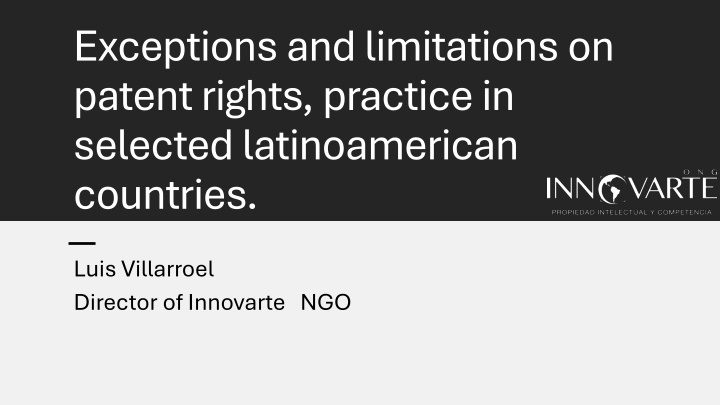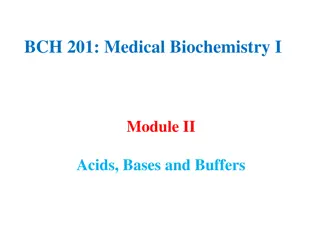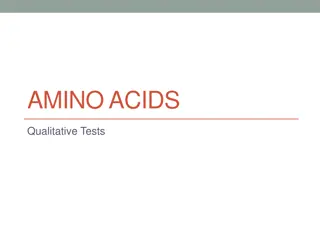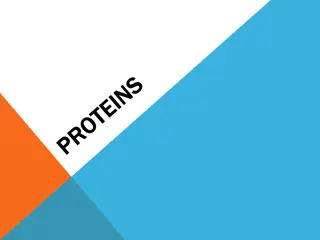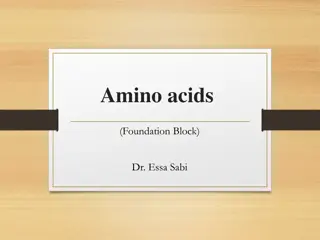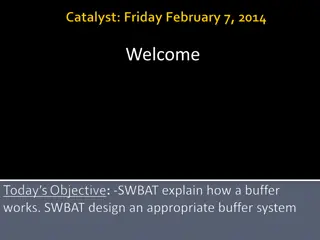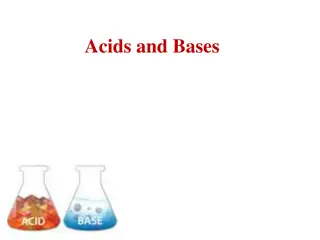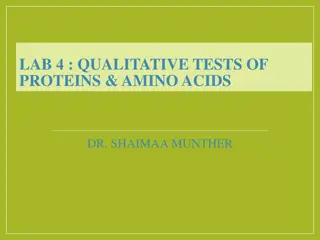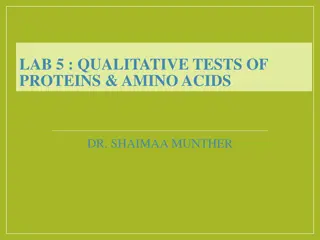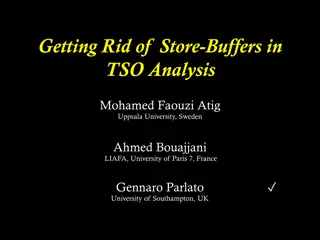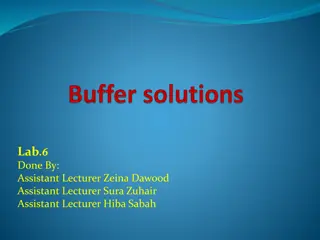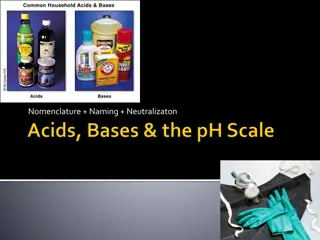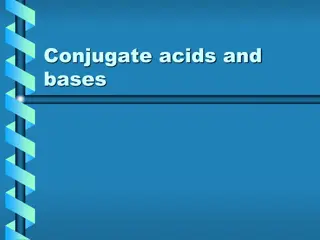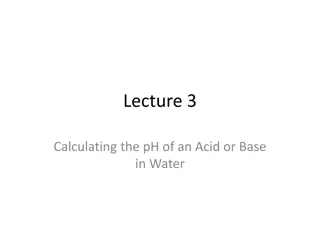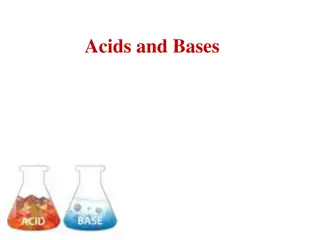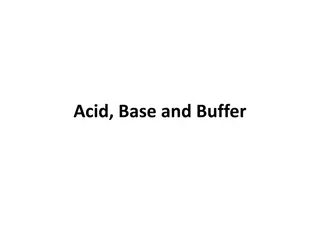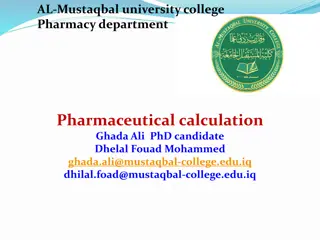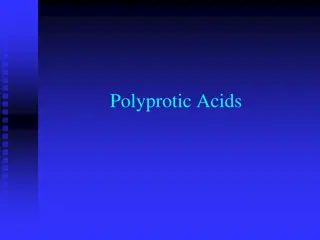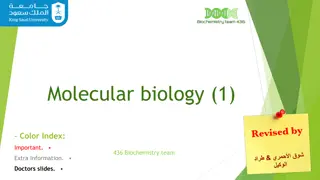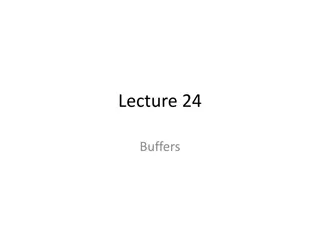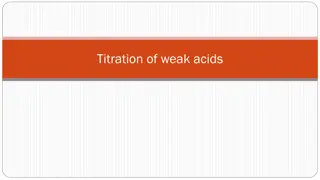Polyprotic Acids in Buffers: Applications & Calculations
Delve into the practical use of polyprotic acids in buffer solutions, exploring their properties, equations, and how to calculate pH levels. Learn about distribution forms in buffers, diprotic acids, and more with examples for better understanding.
Download Presentation

Please find below an Image/Link to download the presentation.
The content on the website is provided AS IS for your information and personal use only. It may not be sold, licensed, or shared on other websites without obtaining consent from the author.If you encounter any issues during the download, it is possible that the publisher has removed the file from their server.
You are allowed to download the files provided on this website for personal or commercial use, subject to the condition that they are used lawfully. All files are the property of their respective owners.
The content on the website is provided AS IS for your information and personal use only. It may not be sold, licensed, or shared on other websites without obtaining consent from the author.
E N D
Presentation Transcript
Exceptionsand limitationson patentrights, practicein selectedlatinoamerican countries. Luis Villarroel Director of Innovarte NGO
TRIPS FLEXIBILITIES TO BE REVIEW ART 44.2 TRIPS ART 31 ART 30 ART 6 LIMITATIONS TO INJUCTIONS NON AUTORIZED USES EXCEPTIONS EXHAUSTION ANDEAN COMMUNITY ECUADOR, PERU, COLOMBIA CHILE URUGUAY
Intellectual Property Legislation and Regulations Ecuador The Organic Code of the Social Economy of Knowledge, Creativity, and Innovation the Knowledge Management Regulation, issued by Agreement No. SENESCYT-2020-077 from the National Secretariat of Higher Education, Science, Technology, and Innovation, provides guidelines for managing intellectual assets in Ecuador. Colombia The Single Circular of the Superintendence of Industry and Commerce (SIC) Decree 4302 of 2008 establishes the procedure for declaring the existence of public interest reasons, as stipulated in Article 65 of Decision 486 of the Andean Community Commission, related to compulsory licenses and public interest. Chile Chile's industrial property regime is governed by Law No. 19,039, Decree No. 82, which approves the regulation implementing Law No. 19,039 on industrial property. Uruguay Decree No. 11/000 of January 13, 2000, which regulates Law No. 17,164. Law No. 17,164, concerning patents for invention, utility models, and industrial designs Andean Community Decision No. 486 of the Cartagena Agreement establishes the Common Regime on Industrial Property
IMPLEMENTATION ARTICLE 44.2 TRIPS ANDEAN COMMUNITY DECISION 486/ 689 ECUADOR COLOMBIA PERU CHILE URUGUAY X X X X X X X X X X NO X
IMPLEMENTATION ARTICLE 31 GOVERNMENT USE DIFERENTIATED FROM COMPULSORY LICENSING. ANDEAN COMMUNITY DECISION 486/ 689 ECUADOR COLOMBIA PERU CHILE URUGUAY X X X X X X X X X X NO X
ART 31 Compulsory Licensing ART 31 Compulsory Licensing ANDEAN COMMUNIT Y DECISION 486/ 689 ECUADOR COLOMBIA PERU Chile Uruguay JUSTIFICATION licencia obligatoria por no explotaci n de la patente, Inter s de p blico, de emergencia, o de seguridad nacional. X X X X NO X X X X X SI X Pr cticas que afectan la libre competencia permitir la explotaci n de otro patente. negativa licenciar voluntariamente en t rminos razonables. X X X X SI X X X X X SI X X
Best practices Chile: The entity requesting CL might be granted provisional use of the license. The granting of the license allows use of relevant data for health authorization. Ecuador: Recognizes Goverment use expressly and witha simplified process. Uruguay provides for a simplified process for compulsory licesing, in case of emergency.
Compulsory licensingproceedingforpublicinterestreasons restrictions .All but Ecuador , do not include separated proceeding for govermentuse. If the goverment need a public non comercial use, needs to follow the process of compulsory license. Non of them, but Ecuador could benefit from EE.UU. Type of goverment use fast mechanism. All require that there is a declaration by the President and relevant Ministers or Minister that public interest justify the compulsory license, before the CL process itself. Need to identify each patent. No reference to pending patents Process for obtaining license might take several years. Subject to different legal challenges. ..
Chilean Chilean proceeding proceeding to to obtain TO 3 TO 3 to to 4 4 years years to to be obtain compulsory compulsory license be completed completed). ). license (UP (UP Study by the Interministerial Commission on public health reasons 6 months Declaration by competent authority Minister of Health in case of health reasons 8 months Notification of the claim Indefinite term (art. 40 and following CPC) Patent holder's appeal 1 month Request of compulsory license Request declare public interest Response to the claim 60 business days Payment of expert fee 60 business days Appointment of Expert Indefinite term Challenge of experts 5-20 business days Expert report 60-120 business days Evidence 45-90 business days Cassation before the Supreme Court 2 years Comments on to the expert report Second expert report 60-120 business days Comments on the second expert report Appeal before TDPI 1 year Judgment
Compulsory Licensing for Dolutegravir Colombia Junio 2023 Agosto 2023 Agosto 2023 2 3 1 Se rechaza solicitud revocacion Resoluci n N 881 de 2023 de Ministerio de Salud y Protecci n Social. Inicia procedimiento declaraci n inter s publico El Comit T cnico Interinstitucional sesiono. October 2023 4 Septiembre 2023 Septiembre 2023 6 5 El Ministerio de Salud y emiti la Resoluci n N 1579 de 2023, declarando oficialmente la existencia de razones de inter s p blico modalidad de uso gubernamental. ElComit T cnico Interinstitucional public sus recomendaciones El Ministerio de Salud y Protecci n Socialresolvi solicitudes de recusaci n y suspensi n del proceso administrativo. Diciembre 2023 Enero 2024 7 8 9 El Ministerio de Salud y Protecci n Social presenta solicitud de la licencia obligatoria para la patente correspondiente al Dolutegravir. Febrero 2024 La Resoluci n N 1579 queda en firme tras la resoluci n de los recursos interpuestos, confirmando la existencia de razones de inter s p blico. apertura de la presentaci n de solicitudes para el otorgamiento de la licencia obligatoria por razones de inter s p blico.
Dolutegravir Colombia Abril 2024 Febrero 2024 Febrero 2024 1 2 1 1 1 0 La Superintendencia de Industria y Comercio inicia proceso licencia La Superintendencia LICENCE IS GRANTED. LaAsociaci n de Laboratorios Farmac uticos de Investigaci n y Desarrollo (en adelante AFIDRO ) demanda de nulidad deckaracion b ante el Consejo de Estado 1 3 Junio 2024 Abril 2024 Mayo 2024 1 4 1 5 La Superintendencia rechaza el recurso de reposici n Los titulares de la patente interponen un recurso cuestionando la modalidad de uso gubernamental y la compensaci n econ mica 1.Titulares demanda a la Rep blica de Colombia por el supuesto incumplimiento del art culo 65 de la Decisi n 486. 1 7 Julio 2024 Julio 2024 establecida. 1 6 ViiV, SHIONOGI y GSK, solicitan anular ante Tribunal administrativo por ilegales declaraci n inter s publico ViiV, SHIONOGI y GSK solicitan ante Tribunal administrativo medida cautelar de suspension provisional de declaraci n inter s publico.
INTERPRETACION REQUISITOS PARA DECLARACION INTERES PUBLICO TRIBUNAL ANDINO proceso 144-IP-2019 ETORICOXIB REQUIREMENTS FOR DECLARATION PUBLIC INTEREST IN CASE OF PANDEMIC. : Identify the pathogen (e.g., specific virus). Describe the characteristics of the disease. Determine the percentage of the affected or at-risk population. Identify the most vulnerable populations. Evaluate the contagion rate and the mortality or severity of symptoms. Analyze the availability and efficacy of other treatments. Assess the capacity of public and private healthcare facilities. Demonstrate the indispensability of the compulsory license. Prove that, without the license, the intended objective would not be feasible.
ARTICLE 30 Comparison of Exceptions by Country ANDEAN COMMUNIT Y DECISION 486/ 689 EXCEPTION ECUADOR COLOMBIA PERU CHILE URUGUAY PRIVATE ACTS FOR NON-COMMERCIAL PURPOSES TEACHING OR SCIENTIFIC OR ACADEMIC RESEARCH X X X X X X X X X NO X EXPERIMENTACI N X X X X X X BOLAR EXCEPTION X X X X X X PREPARATION OF MEDICINES NO EXPRESS NO EXPRESS NO EXPRESS NO EXPRESS X X EXHAUSTION OF RIGHTS X X X X X X
Comparison of Exceptions by Country ANDEAN COMMUNITY DECISION 486/ 689 EXCEPTION ECUADOR COLOMBIA PERU CHILE URUGUAY 5 ter PARIS. NAVES X X X X X X ACTOS PREVIOS X X X X NO X
BEST PRACTICE: Ecuador : Art. 95 Limitaciones y excepciones.- Los derechos y beneficios que resulten de las limitaciones y excepciones establecidas en el presente Libro son irrenunciables. Cualquier estipulaci n en contrario ser nula. Exceptions are non-waivable"
RESTRICTIVE: Peru: Article 39-A: Exceptions to patent rights are limited as per Article 53 of Andean Community Decision 486. If these exceptions unjustifiably interfere with the normal exploitation of the patent or cause undue harm to the legitimate interests of the patent holder, considering the legitimate interests of third parties, the patent holder may exercise rights under Article 52 of the same Decision. Applicable to teaching, scientific, and academic research. Chile: Chile distinguishes itself by lacking specific exceptions for academic or research use of patented inventions. Even in these settings, permission from the patent holder is required. The experimentation exception offers partial relief but does not fully address the gap. Bolar Exception: Uruguay: The Bolar exception is more restrictive, only allowing experimental acts during the final year of the patent's life. This contrasts with broader exceptions in Ecuador, Colombia, and Chile, where regulatory preparation rights are permitted throughout the patent's life.
RESTRICTIVES. PREPARATION OF PRESCRIBED MEDICINES Peru, Ecuador nor Colombia: Neither country recognizes this expressly this exception, but is generally understood to follow within private use. Uruguay: The regulation in Uruguay is more restrictive. In addition to requiring that acts be private and non-commercial, they must not cause economic harm to the patent holder.
CONCLUSION AND RECOMENDATION Compulsory licensing provisions in the law are not enough simplification of the process is needed. Capacity Building for Effective Implementation Strengthen capacity-building efforts to implement all relevant TRIPS provisions on exceptions and limitations, especially: Article 44.2 Limitations on remedies Article 31 Government use Technical Assistance for IP Courts Provide technical assistance to IP courts on best practices for using flexibilities, highlighting their importance for public good and innovation. Patent Law Updates Countries should update patent laws to: Simplify the compulsory licensing process Establish separate government use regulations
THANK YOU LUIS VILLARROEL INFO@INNOVARTE. CL WWW.INNOVARTE.ORG
Colombian Colombian proceeding proceeding 2 2 years years. . Request for declaration of public interest reasons Study by the Interinstitutional Technical Committee Declaration of Public Interest 3 months Publication of the declaration of public interest Patent holder's appeal NOTICE ON THE SUPERINTENDENC Y'S WEBSITE 15 days Submission of the compulsory license request Notification to the patent holder 15 days Formal examination 15 days Evidence Notice to the holder and applicant 5 days Appeal for reconsideration 10 Daysi Other recourse to Andes Court Recourse to State Council. Decision
Ecuatorian Ecuatorian proceeding proceeding Submission of the compulsory license request Examination 15 days Notification to the right holder Declaration of Public Interest Holder's arguments 2 months Resolution Granting licensing Compensation determination. 30 days Evidence 15 days Appeal to IP Comitee Recourse to Andean Court Publication Final decisi n
Uruguay Inters pblico. Uruguay Inter s p blico. Declaraci n que existe inter s p blico Solicitud se declare que existe raz n inter s p blico para licencia Convocatoria a interesados en Obtener Licencia Traslado Titular (Ofertas de licencia) Plazo 30 d as Conciliaci n o arbitraje Resoluci n otorga o rechaza la Licencia
Ecuador: Revocacin licencia de Raltegravir El Tribunal concluy que la revocaci n de la licencia obligatoria otorgada para el medicamento Raltegravir estaba justificada debido a varias fallas. En primer lugar, no se demostr adecuadamente que el uso del medicamento ser a exclusivamente para fines de salud p blica o prioritario dentro de los programas del Ministerio de Salud de Ecuador. Adem s, la Direcci n Nacional de Propiedad Industrial no fundament correctamente el inter s p blico, como lo requiere el art culo 65 de la Decisi n 486 de la Comunidad Andina, que exige que se justifique caso por caso y no de manera generalizada.
